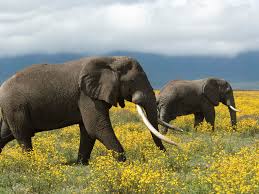To understand why these reasonable-sounding proposals should be rejected, consider what has happened to elephant numbers since CITES most recently authorised some legal trade, when Botswana, Namibia and South Africa were allowed in 2007 to sell a fixed amount of ivory to Japan, as a one-off. Elephant numbers started falling again. A survey conducted in 2014-15 estimated that elephant numbers had fallen by 30% across 18 countries since 2007; another estimated a decline of over 100,000 elephants, a fifth of the total number, between 2006 and 2015. Increased poaching was at least partly to blame.
為了理解為什么這些聽起來合理的提議應該被拒絕,考慮一下《瀕危野生動植物種國際貿(mào)易公約》最近批準了一些合法貿(mào)易之后,大象數(shù)量發(fā)生了什么變化。2007年,博茨瓦納、納米比亞和南非獲準一次性向日本出售一定數(shù)量的象牙。大象的數(shù)量又開始下降。2014年至2015年進行的一項調(diào)查估計,自2007年以來,18個國家的大象數(shù)量下降了30%;另一項研究估計,2006年至2015年間,大象數(shù)量減少了逾10萬頭,占總數(shù)的五分之一。偷獵的增多至少要負部分責任。

These numbers suggest that the existence of even a small legal market increases the incentive for poaching. It allows black-marketeers to pass off illegal ivory as the legal variety, and it sustains demand. The biggest market is in China. Last year the government banned domestic sales of ivory, but its customs officials seize a lot of smuggled products—notably from Japan, which CITES licensed as a market in 2007. For the poachers, ivory is fungible. If it is hard to secure in Zambia or Botswana, another country’s elephants will be in the gun-sights. Congo, Mozambique and, especially, Tanzania, have seen sharp declines. Unfair though it is, countries with better-run conservation programmes are, in effect, paying for the failings of those with feeble institutions.
這些數(shù)字表明,即使存在一個小的合法市場,也會增加偷獵的動機。這會允許黑市商人將非法象牙冒充合法品種,并維持了需求。最大的市場在中國。去年,政府禁止在國內(nèi)銷售象牙,但其海關(guān)官員查獲了大量走私產(chǎn)品,尤其是來自日本(日本在2007年獲得《瀕危野生動植物種國際貿(mào)易公約》的許可)的走私產(chǎn)品。對于偷獵者來說,象牙是可以替代的。如果在贊比亞或博茨瓦納很難保證安全,另一個國家的大象將會成為槍口的目標。剛果、莫桑比克,尤其是坦桑尼亞,人口急劇下降。盡管這是不公平的,但擁有更好管理的保護項目的國家實際上是在為那些制度薄弱的國家的失敗買單。
In the long run technology can help make trade compatible with conservation. In better-resourced national parks, drones are used to make it easier for rangers to spot poachers. DNA testing of ivory shipments can establish where they came from, and thus whether they are legal. As prices fall and countries get richer, both technologies are likely to spread.
從長遠來看,技術(shù)可以幫助貿(mào)易與保護相容。在資源更豐富的國家公園,無人機被用來讓管理員更容易發(fā)現(xiàn)偷獵者。對象牙運輸?shù)腄NA檢測可以確定它們來自哪里,從而確定它們是否合法。隨著成本下降和國家更加富裕,這兩種技術(shù)都有可能傳播開來。
The objection to trade in products of endangered species is not moral, it is pragmatic. When the world is confident that it will boost elephant numbers rather than wipe them out, the ivory trade should be encouraged. Regrettably, that point has not yet come. And until it does, the best hope for the elephant—and even more endangered species, such as rhinos—lies not in easing the ban on trading their products, but in enforcing it better.
反對瀕危物種產(chǎn)品貿(mào)易不是道義上的,而是務實的。當世界相信它將增加而不是消滅大象的數(shù)量時,應該鼓勵象牙貿(mào)易。遺憾的是,這一點尚未到來。在此之前,大象——甚至犀牛等瀕危物種——最大的希望不在于放松對其產(chǎn)品的貿(mào)易禁令,而在于更好地執(zhí)行禁令。
譯文由可可原創(chuàng),僅供學習交流使用,未經(jīng)許可請勿轉(zhuǎn)載。












